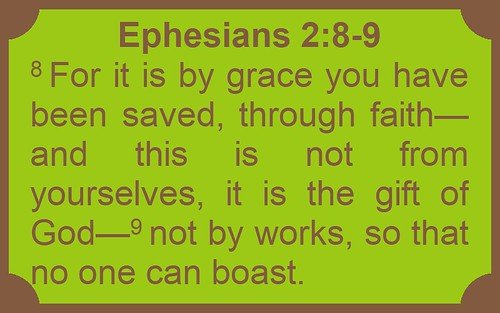Understanding Grace: A Biblical Exploration of God’s Greatest Gift

Grace is one of the most powerful and profound concepts in Christianity, and I often find myself reflecting on its significance in my own life. It’s also one of the hardest concepts to fully grasp. I remember a time when I felt completely overwhelmed by my mistakes and shortcomings. I had made some poor choices that left me feeling lost and unworthy of love. In moments like that, I would find myself wrestling with the question: How can a perfect God lavish us with unmerited favor? Why would He choose to forgive and redeem us, knowing full well all our weaknesses?
As I dove into Scripture, the biblical foundations of grace began to unfold before me like a beautiful tapestry. I learned that grace isn’t just a concept; it’s a profound expression of God’s love for us. One passage that really struck me was Ephesians 2:8-9, which reminds us that we are saved by grace through faith, not by our own works. This was a revelation for me. It was almost liberating to realize that I didn’t have to earn God’s love; it was freely given.
Grace is central to our faith because it reflects God’s character. With each revelation of God’s grace, I found my perspective shifting. It transformed my understanding of not only my relationship with God but also how I view myself and others. When I understood that I was undeserving of grace yet still received it, I felt a deeper sense of gratitude and humility.
Responding to grace in my daily life has become an essential practice. I started focusing on extending grace to others, just as I had received it. I remember a particularly trying relationship where I struggled to forgive someone who had hurt me. It was a challenge, but recalling God’s grace helped me let go of my bitterness. In those moments, I would remind myself of my own flaws and how God still loves me. It compelled me to reach out, to offer forgiveness, and to share love in circumstances where it felt difficult.
Ultimately, grace not only reveals God’s love for us; it transforms how we live our lives. It pushes us to be more compassionate, to seek reconciliation, and to extend kindness even on tough days. As I seek to live in response to God’s grace, I find a sense of purpose and peace that guides me every day. I invite you to explore grace in your own life, to reflect on how it can shape your understanding of love and forgiveness, and to perhaps extend that grace to those around you.
What Is Grace?

Grace has always fascinated me. It’s often described as “unmerited favor,” which means it’s something we don’t deserve and can never earn. It’s a pretty profound concept when you think about it. I remember reading Ephesians 2:8-9 for the first time: “For it is by grace you have been saved, through faith—and this is not from yourselves, it is the gift of God—not by works, so that no one can boast.” Those words hit me deeply; they stripped away my misconceptions about what it means to be loved and accepted by God.
For a long time, I thought that my worthiness was tied to how well I performed, how diligent I was in my spiritual practices, or how good I could be. I kept trying to check off the boxes: attending church, volunteering, praying, and reading my Bible. I thought if I did all the right things, I would somehow earn God’s love and favor. It wasn’t until I had a particularly challenging time in my life that I finally began to understand grace on a different level.
During a tough season, when I felt overwhelmed and inadequate, I remember breaking down and crying out to God. In that moment of vulnerability, I felt an overwhelming wave of peace wash over me. I realized it wasn’t about my efforts or my failures; it was about His unconditional love. The freedom that came from grasping this concept of grace was transformative. It opened my eyes to the truth that salvation, forgiveness, and eternal life are gifts, not rewards for good behavior.
Now, when I think about grace, I see it as God giving us what we could never achieve on our own. It’s like a lifeline when we’re drowning, a warm embrace when we’re cold and alone. It’s comforting to know that I don’t have to strive or prove myself to earn God’s love; I just have to be open to receiving it through Jesus Christ. Embracing grace has changed my perspective on faith and life itself, helping me to lean on Him instead of my own limited strength.
Grace in the Old Testament

Many people associate grace with the New Testament, but it’s woven throughout the entire Bible. In the Old Testament, we see countless examples of God’s grace in action:
- Noah’s Ark: Despite the corruption of the world, God showed grace to Noah and his family by saving them from the flood (Genesis 6:8).
- Moses and Israel: After the Israelites repeatedly disobeyed God in the wilderness, He continued to guide them, provide for them, and fulfill His covenant promises.
- David’s Sin: When David sinned grievously, God forgave him, showing grace even in the midst of discipline (2 Samuel 12:13).
These stories remind us that God’s grace is not a New Testament invention; it’s part of His eternal character.
Grace Fulfilled in Jesus

Grace is a theme woven throughout the Bible, but it reaches its most profound expression in the person of Jesus Christ. I often reflect on John 1:14, which says, “The Word became flesh and made his dwelling among us. We have seen his glory, the glory of the one and only Son, who came from the Father, full of grace and truth.” This verse resonates deeply with me, especially when I consider how Jesus came to earth, fully human yet fully divine, to show us what grace truly looks like.
There was a time in my life when I felt particularly unworthy and distant from God. I remember struggling with guilt over past mistakes, feeling as if I could never bridge the gap between myself and divine love. During that time, I stumbled upon Romans 5:8: “But God demonstrates his own love for us in this: While we were still sinners, Christ died for us.” This verse hit me hard. It was a profound reminder that God’s grace isn’t contingent on my worthiness; rather, it’s a gift freely given regardless of my flaws.
As I learned about Jesus’ life, death, and resurrection, I began to grasp that His grace embodies an invitation to reconciliation with God. It’s easy to get caught up in our shortcomings, but reflecting on Jesus’ sacrifice has been transformational for me. It reassured me that, even in my worst moments, I am loved and accepted.
I’ve come to see grace not just as a theological concept, but as a personal experience. Each time I feel overwhelmed by life’s challenges or haunted by past mistakes, I try to remind myself of this gift of grace. I think about how Jesus chose to live and die for us, even when we were at our lowest. This reality has become a source of strength and comfort in my life, encouraging me to extend that same grace to others.
In sharing this, I hope to encourage anyone who feels unworthy or isolated. Embracing grace can be life-changing, offering us the chance to live in the light of love and acceptance, no matter where we are in our journeys.
How Grace Changes Everything
Grace isn’t just a theological concept; it’s a transformative force in our lives. Here’s how:
- It Frees Us from Legalism
Grace liberates us from the exhausting cycle of trying to earn God’s favor. Instead of striving, we can rest in the assurance that His love is unconditional. - It Empowers Us to Live Differently
Grace doesn’t excuse sin; it empowers us to overcome it. As Titus 2:11-12 explains, “For the grace of God has appeared that offers salvation to all people. It teaches us to say ‘No’ to ungodliness and worldly passions, and to live self-controlled, upright and godly lives.” - It Encourages Forgiveness
When we truly grasp the depth of God’s grace toward us, it becomes easier to extend that grace to others. Ephesians 4:32 reminds us, “Be kind and compassionate to one another, forgiving each other, just as in Christ God forgave you.”
Common Misunderstandings About Grace

Let’s clear up a few myths about grace:
- Grace Isn’t a License to Sin
Some people misunderstand grace as permission to do whatever they want. But Romans 6:1-2 asks, “Shall we go on sinning so that grace may increase? By no means!” Grace transforms, it doesn’t excuse. - Grace Doesn’t Mean Life Will Be Easy
Grace doesn’t eliminate struggles; it strengthens us to face them. 2 Corinthians 12:9 says, “My grace is sufficient for you, for my power is made perfect in weakness.” - Grace Isn’t Cheap
While grace is freely given, it came at a great cost: the life of Jesus. Understanding the weight of that sacrifice helps us treasure the gift.
How to Embrace Grace Daily
Living in the light of grace requires intention. Here are a few practical ways to make grace a central part of your life:
- Reflect on Scripture
Spend time in passages that highlight God’s grace, such as Romans 8, Ephesians 2, and Psalm 103. Let His Word remind you of His unfailing love. - Practice Gratitude
Grace is a gift, and gratitude helps us fully appreciate it. Start or end your day by thanking God for His grace in specific areas of your life. - Extend Grace to Others
Whether it’s forgiving someone who hurt you, being patient with a difficult coworker, or showing kindness to a stranger, let God’s grace flow through you. - Trust in His Promises
When doubts creep in, cling to the truth of Hebrews 4:16: “Let us then approach God’s throne of grace with confidence, so that we may receive mercy and find grace to help us in our time of need.”
Final Thoughts: Grace as a Way of Life

Grace is more than just a concept; it’s a way of life that has truly transformed my own perspective. I remember a time when I felt completely overwhelmed, consumed by guilt and fear about my failures. It was during a challenging season in my life when everything felt like it was piling up—mistakes at work, misunderstandings with friends, and the nagging feeling that I was falling short in so many areas. Each day seemed heavy, and I struggled to find peace amidst the chaos.
But then, I stumbled upon the idea that grace is not something we have to earn. It’s about waking up every day with the assurance that I am loved, forgiven, and capable of facing whatever comes my way. There were moments when I found myself reflecting on the small joys and peace that could be found even in difficult times—whether it was a child’s laughter at the park or the warmth of a friend’s hug. These little instances reminded me that even in my trials, there’s beauty and hope waiting to unfold.
One particular day stands out to me. I was in a coffee shop, surrounded by the usual hustle and bustle. I felt the weight of my worries, but as I watched a stranger help another person who had dropped their belongings, it hit me: grace isn’t just for me to receive; it’s meant to be shared. That small act of kindness reflected the very essence of grace—pointing others to something greater, to the God who lavishes us with love we can never earn.
If you’re feeling weighed down today—by guilt, fear, or the endless pressures of life—remember, I’ve been there too. His grace is sufficient; it’s enough to cover all our mistakes, doubts, and struggles. In my hardest moments, I learned all I need to do is trust Him. Embracing grace has brought me freedom and joy, and I’m continually learning to share that gift with others, inviting them into a life that’s more than just surviving—it’s about truly living.
How has God’s grace impacted your life? Share your story in the comments—I’d love to hear how He’s working in you!





